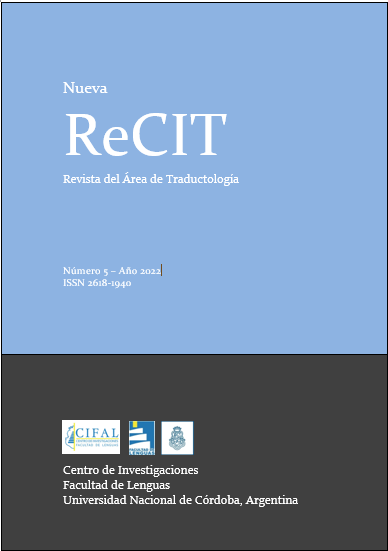Cavafis queer y escritura femenina en traducción
Palabras clave:
Constantino Cavafis, escritura femenina, discurso elegíaco, homosexualidadResumen
En un autoelogio Constantino Cavafis se presenta como el poeta griego ultramodernista de las generaciones futuras. En efecto, C. Cavafis ha logrado superar las barreras de la lengua y la cultura, y se trata de un fenómeno excepcional tanto en el mundo editorial como en el de la traducción literaria griega moderna. Han pasado 86 años desde su muerte y el poeta sigue siendo un código que nos invita a descifrarse. El corazón de su poesía se enmarca en la sexualidad durante la época victoriana en la encrucijada de las civilizaciones de Alejandría a comienzos del siglo XX. El poeta habla sobre una nueva identidad que surge en el ambiente de la Modernidad, la identidad homosexual. En pocas palabras, asocia el deseo, la pasión y el placer con la sexualidad, el poder, el tiempo, la identidad y la política. Todos estos aspectos han sido descritos por Dimitris Papanikolaou (2014), quien realiza el análisis de la obra de Cavafis desde una perspectiva queer, que los ubica en una categoría particular de poemas, los epigramas funerarios griegos. El poeta se apropia de la forma de los epigramas, caracterizada por la insinuación, la burla, la brevedad y la argucia, para referirse a la homosexualidad y sus implicaciones éticas y políticas. Esta apropiación del género poético resulta en una auto/homo/biografía basada en las historias de los homosexuales en un contexto histórico. Las técnicas empleadas tienen mucho en común con la escritura femenina basada en el arquetipo de Antígona. Basándose en el estudio de caso de Myriam Watthee-Delmotte (2016), se observa que la postura del autor tiene más en común con las mujeres que con los hombres. Con las herramientas de la literatura comparada, la traducción comparada y la traducción feminista/queer, el presente estudio de caso pretende examinar las convergencias entre la escritura femenina y aquella de Constantino Cavafis en el discurso elegíaco y cómo estas técnicas se representan en la traducción de D. Mendelshon (2012) al inglés, de M. Volkovitch (2017) al francés y de J. M. Macías (2015) al castellano. Partimos de la hipótesis de que la convergencia de Cavafis y las mujeres escritoras no es aleatoria porque su poesía se centra en una sexualidad oprimida y socialmente no aceptable, que a comienzos del siglo XX estaba sujeta a la descripción, a la categorización y al control. Por lo tanto, esta comunicación espera explorar posibles afinidades entre la poesía de Cavafis y las mujeres, otro grupo social históricamente oprimido.
Referencias
Cavafis, C. P. (2015). Poesía Completa. (Traductor Macías, Juan Manuel). Valencia, España: Editorial Pre-Textos.
Cavàfis, C. (2017). Tous les poèmes. (Traductor Volkovitch, Michel). Atenas, Grecia: Le miel des anges.
Cavafy, C. P. (2012). Complete Poems. (Traductor Mendelsohn, Daniel). Nueva York, Estados Unidos: Alfred A. Knopf.
Kavafis, Konstantinos P. (2009). Anékdota Simiómata Piitikís kai Ithikís [Notas inéditas sobre Poética y Ética]. Atenas, Grecia: Ermis.
Mitsikakos, V. (02 mayo, 2017). Parάllīleς ōdές «stīn pέtra tīn archaίa» – K.P. Kavάfīς kai Katerίna Aggelάkī-Royk [Odas paralelas «en la vieja piedra» – C. P. Cavafis y Katerina Angelaki-Rooke] [Artículo en web]. Recuperado de http://www.poiein.gr/2017/05/02/dhanueeceao-uayo-ooci-dhyona-oci-anassa-edh-eaauoco-eae-eaoanssia-aaaaeuec-nioe-anuoae-i-aaosseco-icooeeueio/.
PaolaProjectTeam (10 septiembre, 2013). Πρώτο Νεκροταφείο Αθηνών: Ένας Περίπατος με την Πάολα - First Cemetery of Athens: A Walk with Paola [Archivo de video]. Recuperado de https://www.youtube.com/watch?v=_bbnORpedk0&t=194s.
Papanikolaou, D. (2014). San ki emena kamōmenoi: O omofylofilos Kavafīs kai ī poiītikī tīs sexoyalikotītas [Creado como yo: El homosexual Cavafis y la poética de la sexualidad]. Atenas, Grecia: Ekdoseis Patakis.
San Juan, E. (2011). A Preface to Charles Sanders Peirce’s Theory of Signs. Philippine Journal of Social Sciences and Humanities University of the Philippines Visayas Volume, vol. 16 (no. 2), p.p. 49-56.
Watthee-Delmotte, M. (2016). Antigone écrivain : le tombeau littéraire au féminin. En Metka Zupančič (ed.), La mythocritique contemporaine au féminin : dialogue entre théorie et pratique (pp. 87-98). París, Francia: Kathala.
Publicado
Número
Sección
Licencia

Esta obra está bajo una licencia internacional Creative Commons Atribución-NoComercial-SinDerivadas 4.0.
Aquellos autores que deseen publicar en Nueva ReCIT aceptan los siguientes términos:
• Los autores conservarán sus derechos sobre el texto entregado y garantizarán a la revista el derecho de primera publicación de su obra. Dicho derecho estará simultáneamente sujeto a la licencia Creative Commons, la cual permite que terceros compartan la obra siempre que
se mencione al autor y al lugar de la primera publicación.
• Los autores realizan una cesión de derechos no exclusivos, lo que implica que la publicación de los artículos en Nueva ReCIT no impide al autor publicar su texto, a posteriori, en otras revistas u órganos editoriales; asimismo, los autores autorizan que el trabajo sea depositado en repositorios institucionales, como el Portal de Revistas de la Universidad Nacional de Córdoba o el Repositorio Digital de la Universidad Nacional de Córdoba.

